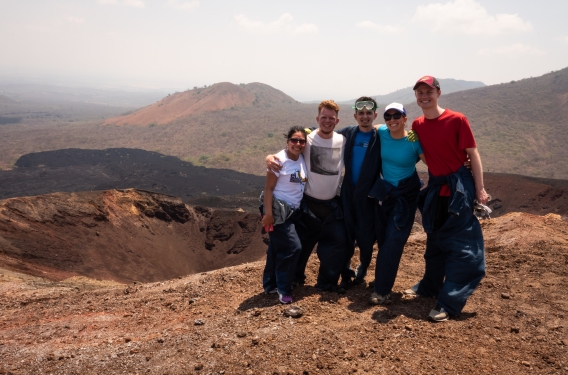October 16, 2019
Why Are Young People Leaving the Church?


The Christian Reformed Church is celebrating an important anniversary this fall: 100 years ago, Johanna Veenstra took a giant leap of faith. In 1919, she stepped onto the steamer Mauretania and crossed the Atlantic to Nigeria. She not only became the CRC’s first female missionary, but the first missionary to serve outside of North America.
Together with you, Resonate Global Mission is continuing her work of answering God’s call to join him in mission, equipping young adults to serve, and raising up female ministry leaders. This blog, written by Resonate missionary Rachel Beveridge, is part two in a series of reflections on how the CRC continues to live out Veenstra's legacy today. Read part one. Read part three.
As a millennial who works with millennials (and younger generations), I sometimes get asked why young people are leaving the church in North America and what churches can do about it. This is a complex, sociological trend that is political, religious, and cultural—but I often focus on just one piece: authenticity.
In my work coordinating Resonate Global Mission’s Cohort in Central America—a yearlong service and missional formation experience for young adults—I see young adults courageously step outside of their comfort zones all the time.
During a year in the Cohort, all of our fellows dive deep into a local community. However, they also have the opportunity to visit other countries in Central America and develop a broader perspective on what is happening in the region and how God is at work.
In June, I traveled with the Cohort to Costa Rica for one of these visits. It turned out to be particularly special because we added in time with one of the organizations where one of our Cohort fellows has been serving this year. The organization houses and educates pre-teen and teen guys in Costa Rica who have either become wards of the state, have committed crimes, or have serious behavioral issues. And this initially shy, non-Spanish speaking fellow has blossomed into a role model who listens to and jokes mercilessly with these Costa Rican kids.
After we spent time with these kids, talking, playing games, and eating ice cream, we walked back to the bus stop. This fellow told me how hard it had been for him to relate to the kids at the beginning. He told me about a 14-year-old who was already a dad, and who, at age 10, had killed someone.
This fellow had to overcome colossal barriers of language, experience, and culture.
It was clear to me that while he might have struggled at the beginning, he had eventually found ways to engage these guys, inspire trust, and win their friendship.
One of the most common experiences that international Cohort fellows face is that when they go home, they are excited to share what they learned and experienced while in a different country. But their desire and enthusiasm are quickly dampened because they quickly realize that only a few people are really interested.
This experience isn’t limited to young adults who have served abroad, however. I recently shared at a conference in North America, and a recent college grad came to my workshop. Unsolicited, she shared with the other participants about how she had recently moved back to her hometown and how unknown she felt by her church. She has never served nor studied abroad, but she shared that during her college years people were friendly (mind you, this is the church that she grew up in), but they never got past asking what classes she was taking. She shared about how now she is trying desperately to re-integrate into her home church, but that she feels like people are uninterested in really getting to know her at a deeper level.
So let’s go back to the Cohort fellow in Costa Rica. He’s had to do the very laborious work of learning how to connect across language and cultural barriers in Costa Rica. He’s also had to learn how to authentically relate to boys that have had very different life experiences than his own.
But when he gets home to North America, will people from his own communities be able to put in the work to authentically engage him?
If there is one thing that you can praise my generation for, I would say it is that we have listened to Dr. Brené Brown: we know that we have to be vulnerable in order to have authentic connection.
So when conversations at church or any other community are superficial, sometimes millennials choose to leave. But when someone—perhaps someone whom we disagree with, theologically or politically— asks questions that show real interest in us, or they themselves show vulnerability, we might stay.
Cohort fellows are courageous. They step seriously outside their comfort zones and make huge efforts to engage in another language. I see them strive tirelessly to understand histories, cultures, and people in Central America. They care. They are people of faith. They are compassionate justice seekers. And I see many young adults, not just the ones that spend time abroad, make these same efforts locally in the communities where they live.
So when people ask me what they should do with the young adults in their churches, I usually respond that they should just ask them good questions. In fact, they don’t even have to be good, they just have to be authentic. Interest is more important than having the “right” question.
A few questions that I wish more people asked the millennials I work with who have gone abroad:
Written by Resonate missionary Rachel Beveridge. Rachel coordinates Resonate's Cohort, a yearlong service and missional formation experience for young adults, in Central America. This post was originally published on The Network.